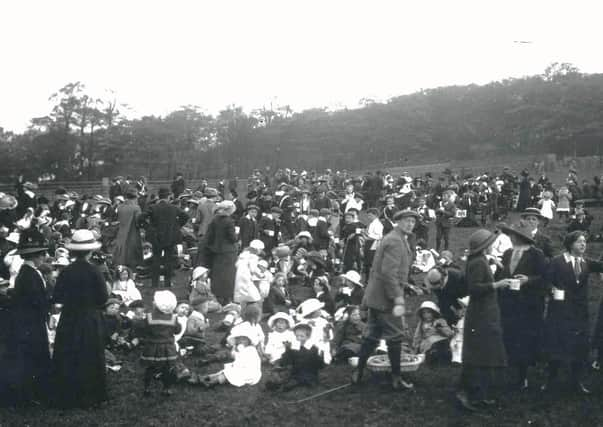The Nostalgia column with Margaret Watson: Reminiscences of Whitsuntide processions


Bill Beattie, of Thornhill Lees, remembers the excitement aroused in his village at Whitsuntide.
Children got a brand new set of clothes and were also able to take part in the annual Whitsuntide procession.
Advertisement
Hide AdAdvertisement
Hide AdBill, who still resides in Thornhill Lees, the village where he was born and raised, writes:


“Being brought up a Methodist and living directly opposite the former Thornhill Lees Wesleyan Chapel, Whit Monday was always a day of great excitement.
“Whit Sunday was important because we visited all our relatives to be given the obligatory copper or two placed in the top pocket of our new clothes.
“My new suit, for some reason, was always bought by my mother at the Co-op in Middlestown. Perhaps the divi there was better, I don’t know.
Advertisement
Hide AdAdvertisement
Hide Ad“But it meant us having to walk from the bottom of Frank Lane where the “A” bus stopped, along ‘Dead Man’s Lane’ (allegedly where the defenders of Thornhill Hall were buried during The Civil War) and then down and up Smithy Brook to the Co-op on the corner.
“On Whit Monday, the local farmer, Leonard Broadhead, used to bring his horse and cart and reverse it down the side of the chapel.
“It was left there for all the gentlemen to decorate ready for the procession around the village.
“The piano was first to be placed on the cart and then the benches for the Primary and Sunday school pupils to sit on. Attached to these were brightly coloured sheets and paper decorations.
Advertisement
Hide AdAdvertisement
Hide Ad“Come early afternoon, all the chapel members and Sunday school children gathered together, ready to be placed on the cart along with the pianist and Mr Cruden, the local iron monger, who played the violin.
“We would set off around the village with members of the youth group and members of the chapel following behind.
“Every so often we would stop and sing a hymn before proceeding further until finally arriving back at the chapel.
“Here, the women had prepared our teas, consisting of potted meat sandwiches, jam tarts and jelly and custard, for everyone.
Advertisement
Hide AdAdvertisement
Hide Ad“Afterwards the men and youth group members carried all the benches for about a quarter of a mile to Leonard Broadhead’s field alongside King Edward Street.
“Once there, we would participate in the usual games of running sack races and, of course, the egg and spoon race, and afterwards the men would take on the youth group in a game of cricket.
“In later years the horse and cart was replaced by one of Leonard Broadhead’s lorries.”
Other readers, like Bill, have been recalling those happy days, including David Watson, who was born in Littletown in 1938, and who people may remember worked at two local mills, Wormald and Walker’s and Lyles mill in Earlsheaton.
Advertisement
Hide AdAdvertisement
Hide AdHe recalls living in an era of patched trousers and darned socks, but he wasn’t alone, and like most other children he did get his annual Whitsuntide clothes.
“We used to go round showing them off to the neighbours and they would give us a few coppers.
“A highlight at that time was the Whitsuntide Walk by members of St Andrew’s Methodist Church.
“There was always the horse and cart on which was placed a piano, and afterwards we enjoyed sandwiches and games in a nearby field.”
Advertisement
Hide AdAdvertisement
Hide AdDavid has written more heart-warming memories of his childhood which I hope to include in future columns.
Perhaps others will be inspired like Bill and David to send in their reminiscences which are an important part of our social history.
Sadly over the years, Whitsuntide processions dwindled until they stopped completely, except perhaps by the Pentecostal churches which still recognise the importance of processions at Whitsuntide or as all Christians know was the Feast of Pentecost.
Customs and traditions, particularly Christian ones, don’t seem to count these days, but there was a time when they were part of our DNA. We fought to keep them, religious or otherwise.
Advertisement
Hide AdAdvertisement
Hide AdThis can be seen during the First World War when food shortages, threatened a centuries old tradition in this district of supplying children with currant buns as part of the Whitsuntide Feast.
The Government had appointed a “Food Controller” to ration certain foodstuffs, and Dewsbury Co-op, who was the main supplier of currant buns at that time, wanted to retain this age-old custom.
Mr Joseph Knight, secretary, of the Dewsbury Pioneers Industrial Society Ltd, wrote to Lord Davenport, who was the “Food Controller” in 1915 who had the final say in what was rationed and what wasn’t
He told Lord Davenport of the tradition in this locality of supplying Sunday schools with currant buns at Whitsuntide, and wanted to know if the custom could continue despite certain food shortages.
The answer was swift and to the point.
Advertisement
Hide AdAdvertisement
Hide AdIt read: “In view of the necessity of conserving our national supply of food, the Controller considers that all such entertainments as those to which you refer should be discontinued.”
This sad news was of such important significance to local people that the headline in the Reporter that week was – “NO CO-OP WHITSUNTIDE BUNS”.
The welfare of the country it seems during war time came before the consumption of currant buns at Whitsuntide.
○ Send your stories of bygone events in Dewsbury to [email protected].